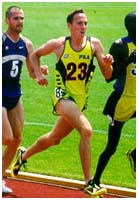Paul Grech discusses the new start rules which have been introduced in 2003
Their work often goes unnoticed, but no athletics’ event could go ahead without them. Starters and track officials suffer the same fate as referees in any other sporting discipline: anonymity if they get it right, criticism when they don’t. Yet their importance can never be understated, particularly in the light of the new false start regulations introduced on the first of January by the IAAF.
Athletes competing in races of 400 metres or shorter are no longer allowed a false start each. Instead, only one false start is allowed in a race, after which any athlete who jumps the gun will immediately be disqualified.
It is a move intended to make athletics more attractive as a spectator sport, particularly for television audiences who were losing patience with events that were taking too long to get underway. But, predictably, these drastic changes haven’t gone down well. Marion Jones described the new rules as “ridiculous”, a view shared by Maurice Green whilst Craig Masback, chief executive officer of US Track and field, stated his disappointment as “the world athletics body has given no chance to the athletes as to what they think. This is unfortunate”.
“The Americans have been particularly outspoken. Very few Europeans have been outspoken. I think it’s a case that the rule is there, you have to apply it and they have to work with it. I think that will happen. I hope so.” With over twenty-five years’ experience as a starter, Alan Bell is qualified more than most to talk about the recent changes. Especially as he was part of the IAAF committee that drafted the new regulations.
“Some athletes have criticised them because some of them might have spent a lifetime training under a system. Some of them have considered the fact that they might lose money as a result. But if you talk to many top athletes privately – and I have been in that fortunate position – I think most of them accept this.”
Like so many others, he started his career as an official to remain involved in the sport after an injury had cut short a career as an international high jumper. He laughs at our suggestion that perhaps failure to make it as an athlete was the real reason for taking up this path and he tells how it has enabled him to officiate at some fantastic venues (last year’s Commonwealth Games held in Manchester are his favourite memory: “We took a lot of pride in doing that.”).
Regardless of the potential benefits that this career might hold, few seem to be interested. Then again, not everyone is capable of doing the job. “First of all, someone who has a good sense of judgement and who is alert. But I think also someone who has the powers of concentration and who is prepared to make a decision very quickly. That is usually based on experience.” Alan says after giving it some thought before admitting that “at the highest levels we now also have the help of a number of technological devices because, with the world’s best athletes you’re looking at thousands of a second.”
A common view is that, given the minimal margin of errors that starters will be allowed under the new rules, they will become increasingly more reliant on the support of technology. But Alan is quick to refute this theory. “It might be a misconception to say that we’ll rely even more. People need to be aware that starters at international level, their judgements are based on visual evidence. The technology is an added advantage in that it gives you another source of evidence. In my experience rarely does the technology contradict what the starters saw. With the new rule, the technology will make the starter more comfortable that the decision made was the right one.”
So there’s no chance that machines will eventually take over the starters’ role? “Absolutely not.” he says. “Within the last month, I was officiating in an international event and the equipment did not work. So the starter has to rely on his visual impact. What has changed over the past years is that we now work much more as a team. Traditionally there was just one starter. Now, at international level, there will be three starters by requirements.”
Nor does Alan think that the new rules put starters under any added pressure. “I believe that once the athletes are aware of the new rules there won’t be a great difference. The athletes will behave and starts will be as good as they’ve always been. Initially there may be pressure on starters and I think that it will be a test of character.”
The question is whether athletes – let alone the spectators – are aware enough of the new rules. Alan’s experience means that he can shed some light on this issue. Unfortunately, what he has to say isn’t too comforting. “Since January I’ve officiated at four international meetings where the new rules were being applied and that’s been in three different countries. There have been athletes from some countries that weren’t informed about the change in the rules.”
“And the way the rules have been promoted in terms of its operation hasn’t been as good as it should.”





















Speak Your Mind